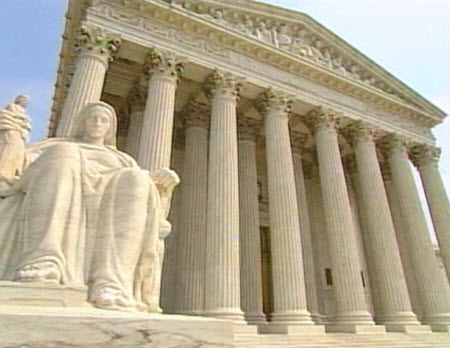Supreme Court Deals Blow to Net Neutrality Rule Fans
Roberts opinion signals limits on deference to agency expertise

The smarter way to stay on top of broadcasting and cable industry. Sign up below
You are now subscribed
Your newsletter sign-up was successful
The Biden administration’s loss in a Supreme Court ruling involving the EPA’s ability to regulate power plants could be a victory for ISPs’ arguments that the FCC was outside its regulatory lane when it reclassified internet access as a Title II common-carrier service subject to open access and other requirements and imposed net neutrality rules.
In the 6-3 opinion handed down Thursday (June 30), Chief Justice John Roberts, who penned the decision, said that in the Clean Air Act, Congress had not granted the Environmental Protection Agency the authority to devise emissions caps based on the electricity-generation shifting approach the EPA took in the Clean Power Plan.
In that opinion, Roberts talked about the limits of the Chevron doctrine, which is the courts’ customary deference to agency expertise when a statute's direction is less than crystal clear.
ISPs have long argued that Congress did not give the FCC the authority it asserted in reclassifying internet access under Title II.
“We presume that Congress intends to make major policy decisions itself, not leave those decisions to agencies,” wrote Roberts, citing then D.C. Appeals Court Judge (now Supreme Court Associate Justice) Brett Kavanaugh in his dissent from a decision by the lower court not to further consider ISPs‘ appeal of net neutrality rules back in 2015.
“Thus, in certain extraordinary cases, both separation of powers principles and a practical understanding of legislative intent make us reluctant to read into ambiguous statutory text' the delegation claimed to be lurking there,” Roberts wrote. Roberts drew an even clearer line around Chevron. “To convince us otherwise, something more than a merely plausible textual basis for the agency action is necessary. The agency instead must point to 'clear congressional authorization' for the power it claims.”
That language is music to ISP ears since it suggests that if the Biden administration was able to restore rules against blocking, throttling and paid prioritization, it might have a hard time this time around surviving a court challenge by ISPs.
There currently are no such rules, as the FCC under then-Republican chairman Ajit Pai threw them out in 2017.
President Joe Biden has supported yet another FCC about-face and return to the rules, but he has only two votes and no near-term prospects of getting the open Democratic seat on the FCC filled.
But not everyone sees the decision as a victory for opponents of net neutrality rules.
“Having a Supreme Court that generally opposes regulation may be viewed by some as a positive for ISPs,” said former top FCC official Blair Levin, “but in the case of net neutrality and on the issues that matter to business models, the EPA decision is, at best, neutral for ISPs; more likely, it is negative for industry.”
That is primarily because Levin sees the decision as making it more likely that ISPs will have to concede states are not preempted from adopting their own rules, as the FCC under Republican Chairman Ait Pai asserted in removing the rules.
Levin explains his take in a new Street Research policy paper titled “The Next Net Neutrality Chapter: Groundhog Day Meets the Monkey’s Paw with Another Round of Losing by Winning.”
“If the ISPs argue that classification and net neutrality rules meet the threshold of being a ‘major question,’ then they are saying that Congress must take some action on the matter for the FCC to have authority to act,” the paper asserts. “That argument implies that in the event Congress has not adopted such rules, the authority of the FCC to preempt state action is significantly weakened.” ■
The smarter way to stay on top of broadcasting and cable industry. Sign up below
Contributing editor John Eggerton has been an editor and/or writer on media regulation, legislation and policy for over four decades, including covering the FCC, FTC, Congress, the major media trade associations, and the federal courts. In addition to Multichannel News and Broadcasting + Cable, his work has appeared in Radio World, TV Technology, TV Fax, This Week in Consumer Electronics, Variety and the Encyclopedia Britannica.

